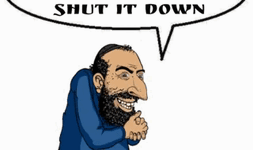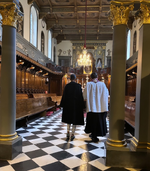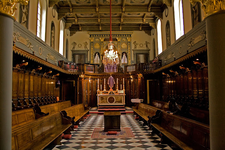You are using an out of date browser. It may not display this or other websites correctly.
You should upgrade or use an alternative browser.
You should upgrade or use an alternative browser.
Candace Owens
- Thread starter It_Is_My_Time
- Start date
Part of me has a certain level of resentment that an angry (or is it nostril flaring righteous indignation?) black woman can say the things in public that I (and other white men) could only state anonymously on a private forum with the hope that my Internet habits are not being monitored by the powers-that-be.
The other part of me thinks that one of the few legal ways to fight the globohomo system is to use its values against itself. In this case, the actions of a protected class member against it can only be beneficial.
It will hopefully be a "red cross - red pill" moment for beltway Christian conservatives to experience the Jewish hostility towards, "Christ the King." Jesus wasn't executed for blasphemy, the attempted religious executions (which the Romans had no interest in) failed. Jesus' crucifixion was because the Pharisees outmanoeuvred Pilate to execute Him by lying to him that Jesus claimed to be a temporal king in defiance of Caesar rather than a heavenly King.
The other part of me thinks that one of the few legal ways to fight the globohomo system is to use its values against itself. In this case, the actions of a protected class member against it can only be beneficial.
It will hopefully be a "red cross - red pill" moment for beltway Christian conservatives to experience the Jewish hostility towards, "Christ the King." Jesus wasn't executed for blasphemy, the attempted religious executions (which the Romans had no interest in) failed. Jesus' crucifixion was because the Pharisees outmanoeuvred Pilate to execute Him by lying to him that Jesus claimed to be a temporal king in defiance of Caesar rather than a heavenly King.
As the ancients used to say: It is what it is.Part of me has a certain level of resentment that an angry (or is it nostril flaring righteous indignation?) black woman can say the things in public that I (and other white men) could only state anonymously on a private forum with the hope that my Internet habits are not being monitored by the powers-that-be.
I also find it infuriating that the only people with enough valor to fight for what's right are getting persecuted, ostracized and humiliated in public, but then again, that's just how history goes sometimes. Oftentimes. No point in crying about it.
She is flying close to the sun.
Wow. They certainly are inching closer and closer to naming the (((source)))
A few years ago, in my Alt Right days, I was quite insulting to Candace. Recently I watched her interview with a Jewish Rabbi and she held her frame beautifully. The Rabbi simply couldn't pilpul her and he tried repeatedly to so. It was masterful, I have to say. So now I'm truly impressed, but a little baffled.
It's not only Candace who's going hard on the Jews, other Alt-Lite figures are addressing the JQ. It's like they got the green light from someone to do so.
It's not only Candace who's going hard on the Jews, other Alt-Lite figures are addressing the JQ. It's like they got the green light from someone to do so.
Isnt the greenlight just now after the Jews mass murdered children (well, still do)?A few years ago, in my Alt Right days, I was quite insulting to Candace. Recently I watched her interview with a Jewish Rabbi and she held her frame beautifully. The Rabbi simply couldn't pilpul her and he tried repeatedly to so. It was masterful, I have to say. So now I'm truly impressed, but a little baffled.
It's not only Candace who's going hard on the Jews, other Alt-Lite figures are addressing the JQ. It's like they got the green light from someone to do so.
It takes a genocid to green light a conversation about the JQ. And then still you need to be a minority to do so. God forbid a white christian guy says one little thing. Thats how protected they are.
She nails the Hiroshima/Nagasaki bombings:
"Tucker derangement syndrome is real.
“It always appeared to us that, atomic bomb or no atomic bomb, the Japanese were already on the verge of collapse." -General Henry H. Arnold Commanding General of the U.S. Army Air Forces Under President Truman
"Japan was at the moment seeking some way to surrender with minimum loss of 'face'. It wasn't necessary to hit them with that awful thing." - General Dwight D. Eisenhower
Needless to say every American has a right to evaluate whether the drastic measure of dropping a nuke on a non-military target in a country that had been on the defense for two years (plus negotiating their surrender) was necessary. You may ultimately conclude it was or wasn’t not— but your right to think critically and express your views is about as American as it gets."
"Will also add here some Christian historical facts: In Nagasaki, the bomb was dropped 300 yards from a Catholic Church— Urakami cathedral. Nagasaki was the epicenter of Japanese Catholicism, home to the second largest cathedral in the East. Church was in session when the bomb was dropped. Of the approximately 12,000 Christians living there at the time, 8,500 were killed, including several dozen parishioners and two Catholic priests, who were hearing confessions in the cathedral that morning.
Very few military men were killed— the overwhelming majority of victims were women and children."
Nobody going to call out the masonic floor?
Thought not.
Thought not.
Candace is a freemason?Nobody going to call out the masonic floor?
Thought not.
Candace is a freemason?
It could be that she’s oblivious to the connection and is sincere, the priest probably is too
I doubt it.Candace is a freemason?
MrRedsquare is probably referring to Masonic lodges, which have dualist chequered floors under the two columns (Boaz and Joachim), which lead to the Masonic altar.
I doubt it.
MrRedsquare is probably referring to Masonic lodges, which have dualist chequered floors under the two columns (Boaz and Joachim), which lead to the Masonic altar.
It could be that she’s oblivious to the connection and is sincere, the priest probably is too
You guys are seriously gullible.
She converted. Maybe she means more?
Regarding the floor, at this point in time anything is possible, conscious or not. It's there, it means something, people pick up on it whether originally intended that way or not.
That said, it seems her intent is to deepen her faith (this is also consistent given other recent things she's said).
The lifesite article mentions Brompton Oratory in London, England. Do any of the Catholics know the history of that place? The checkered floor makes me wince too, but, I assume there is an explanation. John-Henry Westen seems happy and he's a traditional guy. It's says she's with the Confederation of Oratories of Saint Philip Neri and that they are traditional leaning. What do the Catholics here know about them? Are they good?
Regarding the floor, at this point in time anything is possible, conscious or not. It's there, it means something, people pick up on it whether originally intended that way or not.
That said, it seems her intent is to deepen her faith (this is also consistent given other recent things she's said).
The lifesite article mentions Brompton Oratory in London, England. Do any of the Catholics know the history of that place? The checkered floor makes me wince too, but, I assume there is an explanation. John-Henry Westen seems happy and he's a traditional guy. It's says she's with the Confederation of Oratories of Saint Philip Neri and that they are traditional leaning. What do the Catholics here know about them? Are they good?
For those who are unaware, Candace's husband - George Farmer - is a devout Catholic. He is British and from England.
Candace was raised Protestant. There are videos of a debate on Protestantism between her husband and Allie Beth Stuckey.
Also, George's father is a bigwig in England:
Edit. Hmm...interesting...
Candace was raised Protestant. There are videos of a debate on Protestantism between her husband and Allie Beth Stuckey.
Also, George's father is a bigwig in England:
Farmer is the son of Lord Michael Farmer, the founder of British trading conglomerate Metal & Commodity Company Ltd. Lord Farmer is also a member of the House of the Lords, the upper house of the United Kingdom’s Parliament.
Edit. Hmm...interesting...
Catholic Herald: Having grown up as an Evangelical, how did you become a Catholic?
George Farmer: There is a long answer to this and a short answer. The short answer is, to quote Newman, “To be deep in history is to cease to be a Protestant.” In my education, I was steeped in history, and as I matured in my theological life, Catholicism became increasingly apparent to me.
The longer answer is that I grew up in a deeply theological home. My parents, to this day, are rigorous observers of low church Evangelicalism, and growing up, their faith was inculcated into us. In this kind of upbringing, there are lots of things that are very easy to understand, but by the age of 12 or 13, I was starting to have more questions than there were answers being provided.
One of my big questions was around the pre-Reformation Church and the apparent rejection of its theology and practice since the Apostolic period. It didn’t make sense to me that we were saying that the Church, which had spread throughout vast parts of the world, was not evangelical, didactic, polemical, active and all these things we would want it to be until 1517.
The question of how we view this part of Church history became increasingly important, alongside many others, such as the role of Church hierarchy and who spoke authoritatively on moral matters. The big issues in my family’s Evangelical Church were homosexual marriage and whether we could have female pastors. If there was no central body that could teach effectively and authoritatively on these matters, how could we answer these difficult questions?
I ended up getting to a place where Protestantism was not making sense. At St Paul’s, I would have quite animated discussions with the school Chaplain, who, as an Anglo-Catholic, often represented the Catholic position. Up until this point, I had imbued a lot of criticism of the Church without giving it a proper hearing, but I started to find that some of what this priest was saying made a lot more sense than what I was saying.
I started to read a lot, particularly Ratzinger, and then at Oxford started studying the pastric period and the mediaeval Church. After this it didn’t take me long to be convinced of Catholicism, so I went into instruction and became a Catholic through the university chaplaincy.
Last edited:
I'd image you will find many architectural references to Freemasonry in churches and cathedrals, as they were responsible for building them weren't they?







